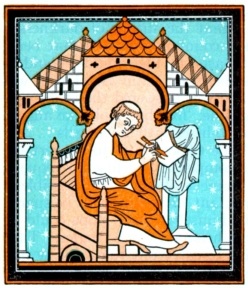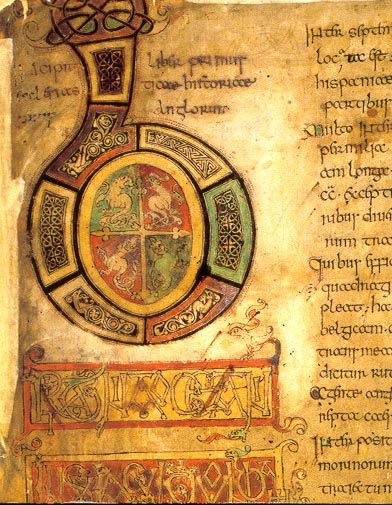
The name of Bede soon became so famous for learning and piety that St. Sergius the Pope thought of calling him to Rome, where, certainly, he might have helped to solve the very difficult questions which had then arisen concerning sacred things. He wrote many books for the bettering of the lives of the faithful, and defending and extending of the faith. By those he gained everywhere such a reputation that the holy martyr Bishop Boniface styled him a Light of the Church; Lanfranc called him The Teacher of the English; and the Council of Aix-la-Chapelle The Admirable Doctor. But as his writings were publicly read in the churches during his life, and as it was not allowable to call him already a saint, they named him The Venerable, a title which in all times after hath remained peculiarly his. The power of his teaching was the greater also, in that it was attested by a holy life and the graces of religious observance. In this way, by his earnestness and example, his disciples, who were many and distinguished, were made eminent, not only in letters and the sciences, but in personal holiness.
Broken at length by age and labour, he was seized by a grievous illness. Though he suffered under it for more than seven weeks, he ceased not from his prayers and his interpreting of the Scriptures; for at that time he was turning the Gospel of John into English for the use of his people. But when, on the Eve of the Ascension, he perceived that death was coming upon him, he desired to be fortified with the last sacraments of the Church: then, after he had embraced his companions, and was laid on a piece of sackcloth on the ground, he repeated the words, Glory be to the Father, and to the Son, and to the Holy Ghost, and fell asleep in the Lord. His body, very sweet, as it related, breathing sweet odour, was buried in the monastery of Jarrow, and afterwards was translated to Durham with the relics of St. Cuthbert. Bede, who was already a Doctor among the Benedictines, and in other religious Orders, and venerated in certain dioceses, was declared by Pope Leo XIII, after consulting with the Congregation of Sacred Rites, to be a Doctor of the universal Church; and the Mass and Office for Doctors was ordered to be recited by all on his feast-day.





